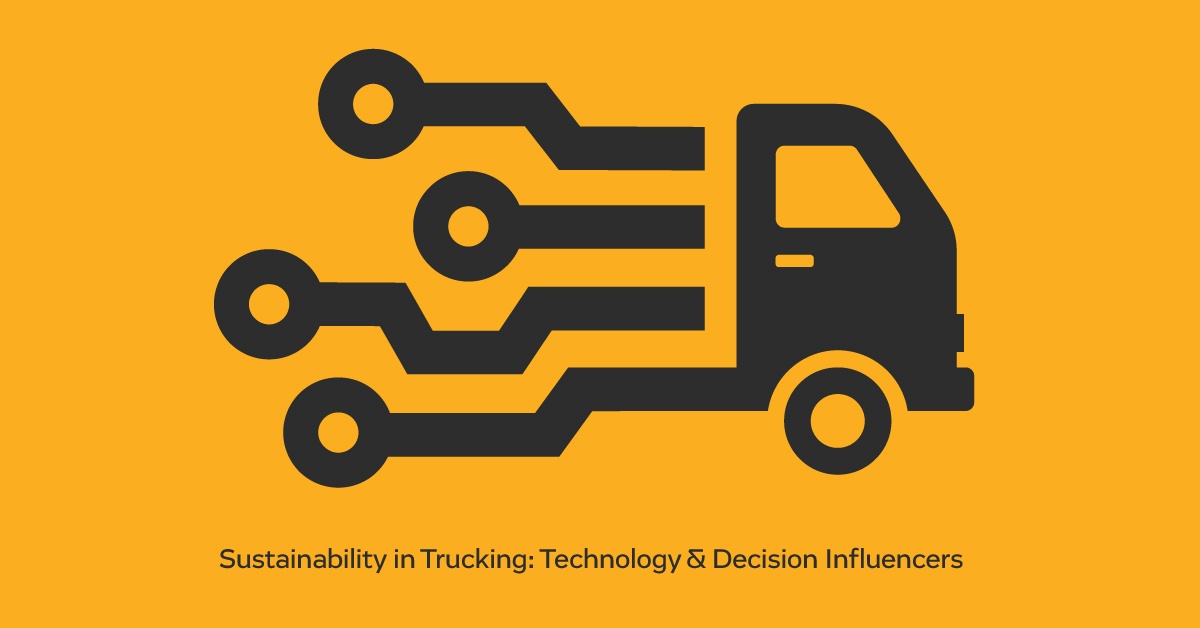Sustainability in Trucking: Technology & Decision Influencers
As trucking has evolved into the major mode of freight transportation, the need for sustainability has become a leading priority for lawmakers, environmentalists and citizens. With truck freight totaling more than 10.4 billion tons per year in the United States alone – and U.S. Environmental Protection Agency research indicating that 27 percent of greenhouse gas emissions result from transportation – the trucking industry in North America is poised with an opportunity to reduce harmful emissions and excess fuel consumption.
The number of legislative mandates aimed at sustainability continues to grow. While these requirements may seem restrictive on the surface, they also can be seen as catalysts for innovation. New developments, such as freight management technology, alternative fuel sources, vehicle efficiency advancements and more, arise almost daily to address environmental responsibility and promote industry growth.
Business leaders increasingly face the challenge of balancing environmental, social and economic implications, however. They must choose between seemingly contradictory goals: quality versus quantity, growth versus stability, environmental responsibility versus cost, competition versus collaboration. However, many new developments in transport are eliminating “either/ or” alternatives and presenting opportunities to choose both.
Let’s look at innovations in freight management technology, for example. With solutions such as our platform and mobile applications, companies can connect in real time to match freight loads with truck availability and locations. Given that American Transportation Research Institute research indicates that between 18 to 21 percent of trucking runs comprise deadhead mileage, load matching that limits deadhead mileage and eradicates empty or light running provides businesses a cost-effective means of increasing productivity and reducing wasted resources. Collaborative partnerships also allow companies to be agile and scale to demand without capital investments. And, functionality such as our Replay feature provides a means to analyze vehicle speeds, routes and driver actions and implement best practices across a fleet. Moreover, the technology’s superior visibility over shipments enables firms to simultaneously deliver services that customers want and demand.
Despite such advancements – and intellectual acknowledgment of the need for environmental responsibility – concern over sustainability doesn’t always play a role in buying behaviors and practices. The question becomes: How can we persuade companies to implement practices that support sustainability if this issue is not currently driving their business decisions?
The answer is clear: We must bridge the disconnect between intellect and behavior. How? By identifying and understanding the hierarchy of factors that influence decision making. Against this backdrop, we gain the ability to develop strategies that appeal to these influencers. Only then will sustainability become a reality.
The gig economy may provide the strategy to make sustainability a reality. The viability of many small to medium businesses (SMBs) in the freight industry is increasingly under attack with the entrance of giants such as Uber and Amazon. SMBs need a means to compete with the “big guys,” and there is no more powerful driver of human – and business – behavior than survival. Many of the technologies and advancements that promote sustainability offer a ready means for SMBs to compete effectively. Perhaps, then, this intersection provides a pathway to follow.
Understanding the forces influencing our industry leaders and our customers, whether environmental responsibility, increased profitability, company stability or otherwise, is essential to evolution, adaptability and sustainability in freight and trucking. We owe it to our industry to examine the drivers at play and leverage them to our advantage.



